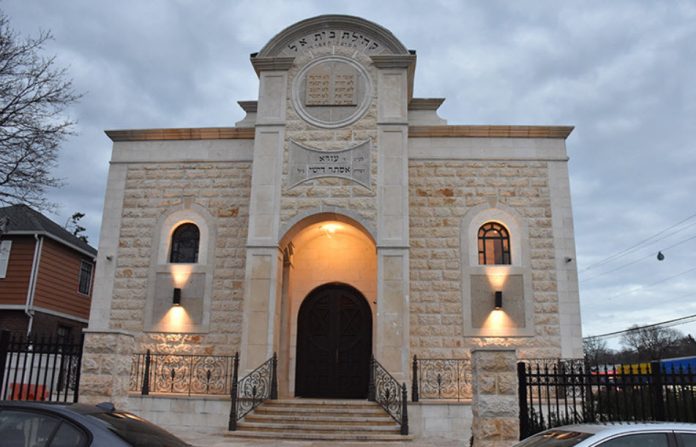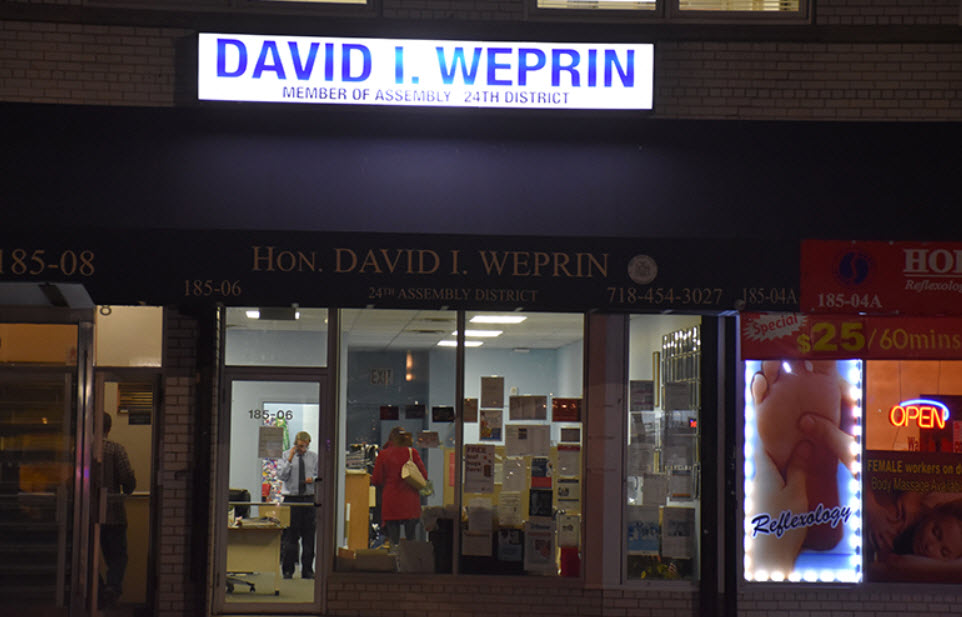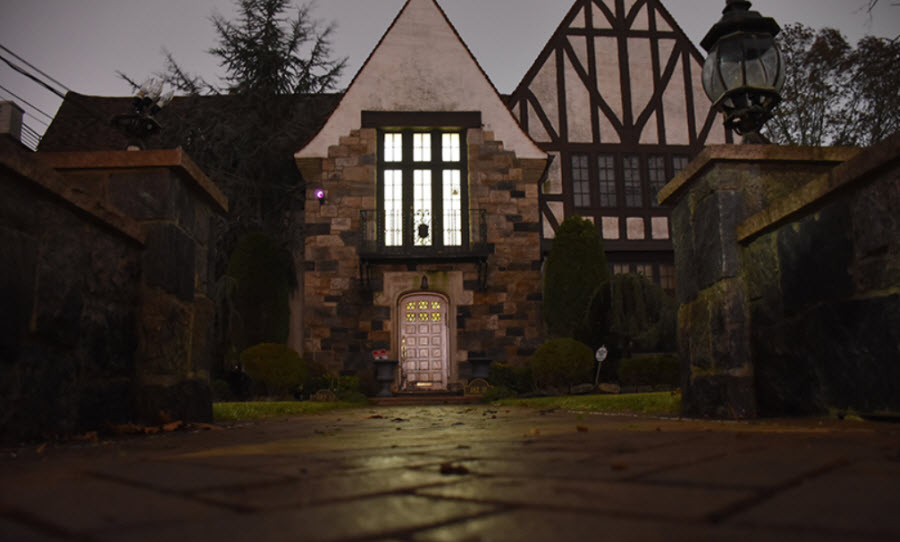
A rough hewn temple of imported Jerusalem stone evokes an ancient monument lit against the night sky in Fresh Meadows, Queens. Inside, a wrought iron and crystal chandelier hangs high above a limestone lobby. The richly appointed synagogue proudly proclaims its benefactor, whose family name is carved into the side: DISHI.
Across town, at least a dozen other buildings in Upper Manhattan owned by New York City landlord Avi Dishi suffer from chronic building violations, leaving low-income, often rent-regulated tenants with broken windows, faulty locks and no heat, according to city records.
Dishi, once listed among the city’s worst landlords, is poised to benefit from a law written by Assemblyman David Weprin and sponsored by state Sen. Leroy Comrie. The legislation was tailored specifically to forgive more than $250,000 in tax debt the landlord incurred on the property where the synagogue stands. The bill became law after Weprin accepted a $2,000 campaign contribution from the landlord himself and then $2,500 from the synagogue, Congregation Beth-El Sephardic Center of Jamaica Estates. The religious charity’s contribution appears to have violated state and federal laws that forbid political campaign activity by 501(c)(3) nonprofits, although Weprin appears to have returned that contribution nearly three months later.
Six charity and campaign finance experts consulted by City & State said the timing of the payments to Weprin and the passage of the bill that Weprin shepherded through the state Capitol raises serious questions about whether Dishi improperly influenced Weprin to push the bill through.
“If I were in charge of the Charities Bureau today, I would definitely take a look at this organization,” said Sean Delany, executive director at Lawyers Alliance for New York and a former chief of the Charities Bureau, which is part of the state Attorney General’s Office.
Dishi, in a phone interview, insisted that there was nothing untoward about he and his charity requesting and receiving a tax forgiveness law from Weprin while giving him campaign contributions.
“Nothing was for him to help, to give contribution, this is not a case like this,” Dishi said. “People never ask for anything and just do good for the community. $2,500? This doesn’t make anyone do for you something. But this is his community. This is his area. This is something he should do for us. I don’t think it is fair, what you are trying to lead this whole story to.”
Dishi said he gives campaign contributions to “maybe 100” local officials wherever he does business, although he said, “I don’t remember all the names.”
But a search of New York City and state election filings found only two contributions by anyone with the last name Dishi. The most recent was Avi Dishi to Friends of David Weprin.
Weprin first introduced the legislation benefiting Dishi in 2016, but it stalled in committee. On Oct. 19, 2016, “Avraham Dishi” contributed $2,000 to Weprin’s campaign fund, according to a state Board of Elections filing.
Congregation Beth-El Sephardic Center of Jamaica Estates, a 501(c)(3) synagogue in Fresh Meadows, Queens, made its apparently illegal contribution of $2,500 to Weprin on May 3, three weeks before the bill passed in the state Senate on May 24, with Comrie sponsoring it. On June 14, Weprin’s bill passed the Assembly unanimously.
Weprin said he returned the charity’s money and provided City & State with a copy of a bank check made out to the charity dated July 25. On Aug. 21, Gov. Andrew Cuomo signed the bill into law.
Weprin denies he made a deal with Dishi. Dishi told City & State he was insulted by the idea that he paid Weprin to make the law.
On the surface, the bill forgives property taxes for the synagogue, but the real effect of the bill is to absolve Dishi of his personal tax liability, since he owned the building for the tax years in question.
Dishi owned the property from 2006 until the end of 2015, when he transferred it to the religious charity, which he controls. He is the president and five of seven board members are Dishi family members.
While it’s unclear exactly what bookkeeping maneuvers Dishi made, three New York tax experts told City & State that Dishi could have benefited himself in a number of ways.
By holding the property in his own name, as he did, for nearly a decade, it appreciated from an assessed value of less than $30,000 to more than $1.4 million, according to city records. Then, when he transferred it to the charity in December 2015, he could have potentially written off over $1 million in taxable income for his contribution to his own charity. In addition, this would allow him to potentially avoid capital gains taxes on the nearly $1.4 million appreciation in property value. Finally, he could then leave the $250,000 property tax debt with the synagogue to be forgiven by Weprin’s bill.
Dishi said it’s all a mistake and blamed the charity treasurer for ever paying any property taxes, which amounted to less than $5,000 quarterly before skyrocketing, along with the rising property value, to about $50,000 quarterly in 2014. Dishi doesn’t believe he should have ever paid any taxes.
“We got everyone we could to help,” Dishi said. “They were supposed to give us a refund for the five years before that.”
Instead, the bill only gives Dishi two years of tax forgiveness.
Alan Blass, a forensic accountant, certified public accountant and former deputy chief investigative auditor for the New York City Department of Investigation, doubts it was all a mistake.
“I think he manipulated this whole thing in order to get the bigger charity write-off and to get the lower amount of taxes for all the years he owned it,” Blass said. “But I’m wondering how he did it and who may have helped him.”
Nevertheless, it appears the city will soon erase Dishi’s debt.
“David Weprin is a very nice man. He is a very honest man. You ask him any favor and he will do it. Not about any personal interest, only for help, you know? Especially in a holy place, like a synagogue.” -Rabbi Yakov Nasirov
A spokesperson for the New York City Department of Finance said once the charity provides documentation that shows the property was used for a tax-exempt purpose, operating as a synagogue, for instance, “We would approve the retroactive exemption.”
The department noted in an email to City & State that the bill is “specific” because “it allows an organization to receive a real property tax exemption under 420a when it was not the fee owner.” Nevertheless, the agency will grant the exemption if the synagogue provides affidavits or other proof that it was operating as a religious institution and will cancel the debt incurred by Dishi.
It is not unusual for a charity to request tax forgiveness and for state lawmakers to pass laws forgiving it, but experts said a bill passed to effectively forgive a privately incurred tax debt was highly unusual – especially the private debt of a wealthy landlord.
“In my experience, it is unusual for the legislature to enact a law that gives the city the discretion to forgive the property taxes owed on privately owned property prior to that property becoming tax-exempt,” said Richard Pomp, a law professor at University of Connecticut and former director of the New York Tax Study Commission.
Weprin told City & State that “Dishi never got a tax bill” for the property, but that is untrue. His name is at the top of every property tax bill from October 2006 until February 2016. That final tab, addressed to Dishi, totals $256,515.25.
The more than a quarter-million dollars in property taxes incurred by Dishi will likely be canceled or annulled for tax years 2014-2015 and 2015-2016. Dishi personally owned the property from October 2006 until December 2015, when he sold it for $0 to the charity, according to city records.
“There are enough coincidences, you could say, related to the timing, that an aggressive U.S. attorney might make something of it,” said Marc Owens, a partner at Loeb & Loeb, who was director of the Internal Revenue Service’s Exempt Organizations Division for 10 years, in charge of enforcement programs for charities and political organizations.
Considering the political contributions and what seems to be a bill that excuses a personal tax liability, Owens said, “You’ve got elements of the sort of thing that certainly the U.S. government or state attorney general would be interested in.”
Weprin said he never should have accepted the synagogue’s money. “Yeah, they might have been grateful, but it’s certainly not a legal contribution,” Weprin said of the charity’s $2,500 campaign donation. “We shouldn’t have accepted it. It was a mistake.”
All charities are barred from making campaign contributions to political candidates, although experts note that a few organizations accidentally write checks to candidates every year. Nevertheless, “Contributions to political campaign funds … clearly violate the prohibition against political campaign activity,” according to the Internal Revenue Service.
But Weprin dismissed experts’ concerns about an exchange of favors with the landlord who controls the religious charity. “There was absolutely no deal,” Weprin said. “I didn’t know anything about this Avi Dishi stuff. And I had no dealings with Dishi. It was all with the rabbi” – Rabbi Yakov Nasirov, the prominent local rabbi at Congregation Beth-El.
Weprin only shrugged when asked about Dishi’s personal $2,000 campaign contribution.
“I’ve known Rabbi Nasirov as a rabbi in my district in another synagogue around the corner, so I’ve known him for 15 years or so,” Weprin said. “He was the one who came to me.”
The synagogue is just five blocks from Weprin’s district office.
City & State tried to speak with a synagogue leader by phone and then visited the building last week, finding only a few men praying alone in the gilded sanctuary.
Nasirov called City & State the following morning, but quickly grew frustrated with the line of questioning and declined to answer specific questions about the campaign contributions and Weprin’s law.
“David Weprin is a very nice man,” Nasirov said. “He is a very honest man. You ask him any favor and he will do it. Not about any personal interest, only for help, you know? Especially in a holy place, like a synagogue.”
“No politics, no money, no interests here,” he added.
Nasirov refused to answer questions about Weprin’s account of returning the money to him.
“I did hand-deliver the $2,500 check to the rabbi,” Weprin said, adding he returned the money on July 25 and said Nasirov seemed confused as to why the money was being returned to him. “I actually brought it to his house.”
While the state Board of Elections has no record of the charity’s money being returned yet, Weprin said the refund will be reflected in the next filing period.
“This creates the perception of a quid pro quo,” said Alex Camarda, senior policy consultant for good government group Reinvent Albany. “It is unfortunate this ill-advised state law appears to require the city to waive property taxes for a landlord who has been perpetually sued for violations and does not seem to provide basic services to or maintain his buildings.”
Avraham Dishi, or Avi Dishi as he is known, owns a portfolio of residential and commercial properties in New York and Florida. In New York City, Dishi owns both multimillion-dollar mansions in midtown Manhattan and rent-regulated housing in lower-income neighborhoods.
Dishi paid $24.5 million, at over $1,000 per square foot, in 2010 to buy the Upper East Side mansion of famed sex therapist Ruth Westheimer, better known as Dr. Ruth, The Real Deal reported. Dishi also snapped up another building nearby for $10.1 million in 2011, The New York Times reported.
But Dishi has been sued many times by city regulators and his tenants for neglecting to maintain his buildings and for creating a hazardous living environment. City records show complaints settled for injuries caused by negligence, cases won by tenants for overcharging for rent and multiple cases where heat was cut off.
“Every winter she could look forward to freezing,” Maddy Tarnofsky said of her tenant, Zeynep Osman, an elderly resident in a rent-controlled Manhattan property. Osman is an unusual tenant for Dishi – she’s an exiled Afghan princess who lives on Lexington Avenue south of East 74th Street, whose peculiar plight was chronicled by the Times in 2014. The eviction proceedings Dishi has brought against her have stalled, and remain unresolved.

But many of Osman’s complaints mirror those of less noble heritage and address – no repairs and no heat.
The problems at one building at the corner of St. Nicholas Avenue and West 183rd Street in Upper Manhattan earned Dishi’s name a place on then-Public Advocate Bill de Blasio’s worst landlord list, according to his archived website.
Dishi has been sued 23 times by the New York City Department of Housing Preservation and Development for violations at that one building, including for lead paint and no heat or hot water. The building has 74 unresolved violations, as of Dec. 11, including 16 issued in the past three months.
“That is crazy, you don’t see that,” said Judith Goldiner, attorney-in-charge at The Legal Aid Society, as she looked at the number of lawsuits against Dishi. “Based on these records, this is a bad landlord.”
“After years of litigation, he still has 74 violations,” she added.
Dishi said that the problems at his properties can be blamed on a combination of bad tenants, a bad neighborhood and previous bad management.
“It was poor management that we had for the last many years. But now I am stepping in with my children,” Dishi said. “Ninety-eight percent of all the violations you see, 75 or 200 violations, most of them are done.”
“Generally we are on top of it,” Dishi said.
City & State visited the Upper Manhattan building and found the front door unlocked. The elevator, which has an unresolved building violation for a safety issue with an unpaid fine of $5,000, was open and operating. A window up the stairs from the lobby was shattered.
Four tenants described their experience living in the building with responses ranging from “fine” to “terrible.”
The building does not appear to be an outlier: Of 12 residential buildings in that area owned by Dishi, there were an average of 63 open violations per building, according to a survey by City & State.
“He should be using his tax savings to repair the buildings where he has rent-paying tenants,” Tarnofsky said. “But I wouldn’t hold my breath.”
“This creates the perception of a quid pro quo. It is unfortunate this ill-advised state law appears to require the city to waive property taxes for a landlord who has been perpetually sued for violations and does not seem to provide basic services to or maintain his buildings.”–Alex Camarda, senior policy consultant with Reinvent Albany
The bill to forgive the tax debt incurred by Dishi was first introduced by Weprin in May 2016, but it stalled in committee. Weprin reintroduced the legislation in February 2017. The state Senate bill was sponsored by Comrie, whose district abuts the congregation and where “most of the congregants” that attend the synagogue actually live, according to Comrie.
Just before the Senate vote, the bill was vociferously opposed by state Sen. Tony Avella, who argued that since the property was not owned by the organization at the time the taxes were owed, it could not be forgiven, and that building itself had many outstanding violations with the New York City Department of Buildings. One violation, classified as hazardous, has remained open since 2013 for operating as a synagogue without a valid certificate of occupancy.
Comrie defended his tax forgiveness bill on the Senate floor, saying the property was “abandoned and difficult to move for over a dozen years” and that the congregation was working hard to clear up the violations in order to be able to get a mortgage to buy the property.
“Comrie lied,” Avella said. “We have the transcript. What he said is not true.”
In fact, the property was not abandoned. The congregation had been meeting on that spot in an older building for many years. Dishi, who has controlled the charity since its incorporation in 2007, owned the property himself since 2006 and could have transferred it at any time. In terms of violations, the charity apparently had failed to get a basic piece of certification, its certificate of occupancy, since it opened in 2013. And even as Comrie spoke, the congregation had no need of a mortgage – it already owned the property outright since December 2015.
Nevertheless, moments later, the Senate passed the bill.
Weprin said that what Comrie said was not true.
When asked why Comrie defended his bill with false information on the Senate floor, Weprin smirked and said, “I don’t know. I wasn’t there.”
Comrie declined to comment after City & State sent a detailed list of questions to his office.
Avella said he is “shocked that the governor signed it,” explaining that although he had sent out two press releases in May denouncing the bill, he had not known the bill was signed into law. “I think it’s outrageous.”
A spokesperson for Gov. Andrew Cuomo’s office said that the day City & State sent its questions was the first time the governor’s office had heard of complaints from Avella.
“This is one of dozens of bills that pass the legislature every year that would allow localities to provide tax exemptions to not-for-profit corporations,” said Abbey Fashouer, a Cuomo spokeswoman. “The city was consulted, as is customary, on this legislation and expressed no objections. To be clear, this bill does not require the city to provide the exemption, rather it simply allows them to issue the exemption if they deem it appropriate. That final determination lies with them, not the state.”
Avella, who caucuses with the state Senate Independent Democratic Conference, said he planned to petition New York City Mayor Bill de Blasio to have the city’s finance office reject the application to clear Dishi’s tax obligations to the city.
A regal residence owned by Avi Dishi, just a 15-minute walk from the synagogue, is surrounded by a stone wall with massive sconces, one of which is missing, leaving wires exposed to the rain on a recent weekday evening.
Most of the lights were out, but security cameras with glowing red diodes hung in the trees, keeping watch. A “no trespassing” sign was staked into a planter. No one answered the doorbell.
Across the street, a neighbor said she sees the Dishi family only occasionally – they seem to rotate between their many houses, she explained.
In front, a “for sale” sign swung in the damp air. The real estate broker said you can buy Dishi’s house for $3.99 million.
Zach Williams contributed reporting.
Correction: An earlier version of this post misspelled the name of Alan Blass, the former deputy chief investigative auditor of the New York City Department of Investigation.
credit to cityandstateny.com









